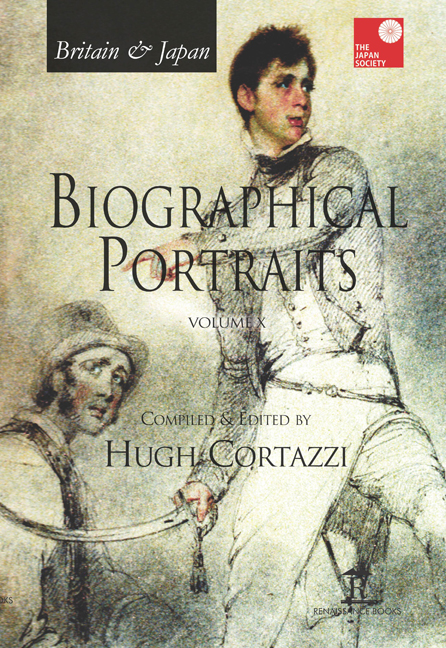Book contents
- Frontmatter
- Dedication
- Contents
- Introduction
- List of Contributors
- Index of Biographical Portraits in Japan Society Volumes
- PART I BRITAIN IN JAPAN
- PART II JAPAN IN BRITAIN
- Select Bibliography of Works in English on Anglo-Japanese Relations [Compiled by Gill Goddard – Retired East Asian Studies Librarian, University of Sheffield]
- Select Bibliography of Works in Japanese on Anglo-Japanese Relations [Compiled by Akira Hirano, SISJAC]
- Index
16 - The Archdeacon and the Canon: The Hutchinsons of Japan
Published online by Cambridge University Press: 07 May 2022
- Frontmatter
- Dedication
- Contents
- Introduction
- List of Contributors
- Index of Biographical Portraits in Japan Society Volumes
- PART I BRITAIN IN JAPAN
- PART II JAPAN IN BRITAIN
- Select Bibliography of Works in English on Anglo-Japanese Relations [Compiled by Gill Goddard – Retired East Asian Studies Librarian, University of Sheffield]
- Select Bibliography of Works in Japanese on Anglo-Japanese Relations [Compiled by Akira Hirano, SISJAC]
- Index
Summary
INTRODUCTION
IN RETIREMENT THE former canon of Fukuoka lived in Bristol, much colder if not bleaker than either Kyūshū where he had spent so many years or the West Indies where he worked in the war years after 1941. Archibald Campbell Hutchinson (1883–1981) was a member of the second generation of his family to serve as Church Missionary Society (CMS) missionaries in Japan, and like his father, Archdeacon Arthur Blockey Hutchinson (1841–1918) worked in Kyūshū diocese of the Nippon Seikō kai (Japan Anglican Church). His younger brother, Ernest Gordon Hutchinson (1889–1973) also served in Japan but in Kobe and Tokyo dioceses rather than in Kyūshū. This article focuses on the archdeacon and his son, the canon, who were both significant Anglican missionary figures in Kyūshū diocese.
A.B. Hutchinson was the son of a cloth merchant in London. Although Hutchinson wanted to become a missionary early in life, his father insisted that it was his duty as the eldest son to enter the family firm and business. It was only after a bank failure in which the family lost everything that his father allowed him to do as he wanted. Hutchinson was twenty-five when he offered himself to the CMS, attending their training college in Islington and graduating in 1867. After ordination and a curacy in England, Hutchinson was sent to Hong Kong in 1871. The ministry and then missionary work allowed both Hutchinson and his CMS colleague, Charles Frederick Warren (1841–1899), who had few financial or social advantages, to break away from the pattern of long hours, financial insecurity, and trade which characterized the history of their families. Missionary work was the path which provided the opportunity of upward social movement for themselves and their children. The opportunity of being a missionary in Japan undoubtedly brought with it the possibility of a higher standard of living than that which a rural curate with a growing family could ever hope to aspire to. If Hutchinson and Warren had to struggle to reach first Hong Kong and then Japan, the second generation of Hutchinsons and Warrens, like the second generation of CMS missionaries generally, were Monkton Combe and Oxford graduates. There was a strong element of self-improvement at work in both families.
- Type
- Chapter
- Information
- Britain & Japan Biographical Portraits Vol X , pp. 187 - 194Publisher: Amsterdam University PressPrint publication year: 2016

